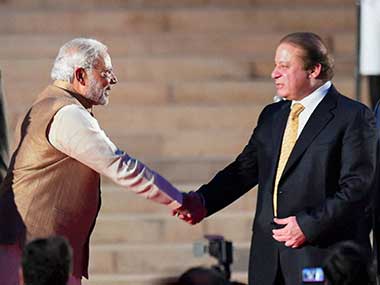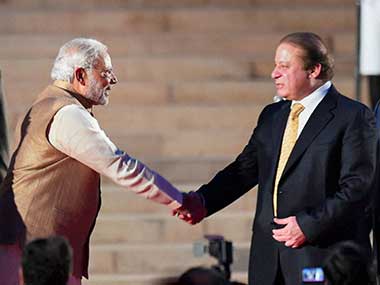As Prime Minister Narendra Modi and his Pakistani counterpart Nawaz Sharif arrive for the SAARC summit in Nepal starting on Wednesday, there is little chance the two leaders will be able to avoid an interaction. While Wednesday morning will be devoted to policy statements by the eight Saarc leaders, the afternoon could well see the two neighbours meet, even if informally. The Ministry of External Affairs, though, has refused to confirm any such meeting. [caption id=“attachment_1820185” align=“alignleft” width=“380”]
 Prime Minister Narendra Modi and his Pakistani counterpart Nawaz Sharif. PTI[/caption] If indeed such a meeting does take place, Modi is likely to talk tough on a host of issues including Sharif’s attempt to internationalise the Kashmir issue by taking it to the United Nations. He is also likely to raise the recent incursions along the LoC and International Border, as well as Sharif’s meeting with Hurriyat leaders in Jammu and Kashmir. Both incidents have contributed to a souring of ties between the two nations, and addressing them will undoubtedly have significant political gains for the BJP in the state, given that Assembly elections are currently underway. “It is our intention to hold as many bilateral interactions as possible,” MEA spokesperson Syed Akbaruddin said on Monday, adding that “the policy statements would be in alphabetical order and Prime Minister Modi would lay out his vision of what he sees as regional cooperation in South Asia and India’s approach to harnessing developmental potential of the region as a whole.” However, he remained non-committal on whether a meeting between Modi and his Pakistani counterpart Nawaz Sharif would take place, saying that the schedule is yet to be firmed up. However, Sharif, too, is expected to put up a brave front and has already been briefed by Pakistan’s intelligence agency ISI,
according to this Economic Times report
. “Pakistan’s intelligence agency ISI chief Lt General Rizwan Akhtar met Sharif and briefed him about matters relating to national security, just ahead of his summit tour. According to diplomatic sources in Islamabad, Sharif wants to be prepared about the latest Line of Control skirmishes and other external security issues.” Saarc meeting apart, Sharif once again unsuccessfully attempted to pull in US President Barack Obama to intervene on the Kashmir issue during his scheduled visit to India as chief guest for Republic Day celebrations. Sharif in a telephonic conversation last week, had reminded the US President of his pending visit to Pakistan. However
a release from the Pakistani Foreign Office
said that Obama had told Sharif he would visit the country ‘only when the situation normalises’. Further, according to the release, Sharif urged Obama to bring up the Kashmir issue during his visit to India, but the White House,
in its release
, makes no mention of it, indicative of a stern ’no’. “The Prime Minister also urged President Obama to take up the cause of Kashmir with the Indian leadership, as its early resolution would bring enduring peace, stability and economic cooperation to Asia," the Pakistani release said. But Pakistan’s move to seek help from the US is understandable,
as Firstpost senior editor Sandipan Sharma notes,
given that the Sharif-led nation looks up to the US as a ‘big brother’.
Prime Minister Narendra Modi and his Pakistani counterpart Nawaz Sharif. PTI[/caption] If indeed such a meeting does take place, Modi is likely to talk tough on a host of issues including Sharif’s attempt to internationalise the Kashmir issue by taking it to the United Nations. He is also likely to raise the recent incursions along the LoC and International Border, as well as Sharif’s meeting with Hurriyat leaders in Jammu and Kashmir. Both incidents have contributed to a souring of ties between the two nations, and addressing them will undoubtedly have significant political gains for the BJP in the state, given that Assembly elections are currently underway. “It is our intention to hold as many bilateral interactions as possible,” MEA spokesperson Syed Akbaruddin said on Monday, adding that “the policy statements would be in alphabetical order and Prime Minister Modi would lay out his vision of what he sees as regional cooperation in South Asia and India’s approach to harnessing developmental potential of the region as a whole.” However, he remained non-committal on whether a meeting between Modi and his Pakistani counterpart Nawaz Sharif would take place, saying that the schedule is yet to be firmed up. However, Sharif, too, is expected to put up a brave front and has already been briefed by Pakistan’s intelligence agency ISI,
according to this Economic Times report
. “Pakistan’s intelligence agency ISI chief Lt General Rizwan Akhtar met Sharif and briefed him about matters relating to national security, just ahead of his summit tour. According to diplomatic sources in Islamabad, Sharif wants to be prepared about the latest Line of Control skirmishes and other external security issues.” Saarc meeting apart, Sharif once again unsuccessfully attempted to pull in US President Barack Obama to intervene on the Kashmir issue during his scheduled visit to India as chief guest for Republic Day celebrations. Sharif in a telephonic conversation last week, had reminded the US President of his pending visit to Pakistan. However
a release from the Pakistani Foreign Office
said that Obama had told Sharif he would visit the country ‘only when the situation normalises’. Further, according to the release, Sharif urged Obama to bring up the Kashmir issue during his visit to India, but the White House,
in its release
, makes no mention of it, indicative of a stern ’no’. “The Prime Minister also urged President Obama to take up the cause of Kashmir with the Indian leadership, as its early resolution would bring enduring peace, stability and economic cooperation to Asia," the Pakistani release said. But Pakistan’s move to seek help from the US is understandable,
as Firstpost senior editor Sandipan Sharma notes,
given that the Sharif-led nation looks up to the US as a ‘big brother’.
Fundamentally, there must be something wrong with the mindset of a country that advises another country’s President on what to say while visiting some other nation, albeit a neighbouring one in this case. Under normal circumstances, this choice is left to the guest and the host. India would sound stupid if it were to advise Sharif on what to discuss with the Chinese premier, for example. But the India-Pakistan equation is different and such rules of diplomatic civility do not apply here. Also, Pakistan looks up to the US as a big brother whom it can approach and ask to intervene in disputes that its politicians are not capable of addressing. So no one can blame Pakistan for asking Obama to ratchet up the heat on Kashmir, especially when Sharif’s initial bon homie with Narendra Modi has degenerated into acrimony and the Valley has fallen off the table as a subject of dialogue between the two neighbours with no future parleys in sight.
This will be Modi’s second interaction with leaders of the other seven nations - Bangladesh, Bhutan, the Maldives, Nepal, Pakistan, Sri Lanka and Afghanistan - as they attended his swearing-in ceremony in May this year. Accompanying Modi will be External Affairs Minister Sushma Swaraj, NSA Ajit Doval and Foreign Secretary Sujatha Singh.
)